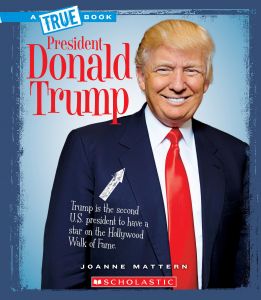
Kids have fun kicking off the summer reading program at a public library in Oklahoma. (Photo by Pioneer Library System | Flickr CC 2.0)
The New York Times recently ran a peculiarly pathetic article about yet another victim of the Trump administration that you probably never thought to worry about: the children’s publishing industry. The problem, as the article’s author, Katherine Rosman, repeatedly implies but cannot come out and say, is that Donald Trump is pretty much a walking advertisement for everything we don’t want our children to be. And yet he’s the president. Children are supposed to respect the president. What to do?
Take, for instance the problem of racism. How to explain the fact that not only is Trump a racist, but that racism is a fundamental reason his supporters like him so much? The updated edition of Time Inc.’s Presidents of the United States series explains: “He made controversial remarks about several groups of people, including Latinos, Muslims, African-Americans and women,” and “This led many, including some Republican officials, to back away from him.” Even so, it notes, “Trump continued to receive wide support and thousands of people attended his rallies.”

A True Book: President Donald Trump describes his career in real estate before he entered politics, as well as how his opponent, Hillary Clinton, was perceived by the public during the 2016 campaign. (From The New York Times)
Like so many journalists who write for grown-ups, the word “controversial” is expected to carry a great deal of freight here. In the above it could mean “racist” or “sexist” or “ignorant” or “violence-promoting” or “rape-friendly.” No less ambiguous are the words applied to Hillary Clinton’s shortcomings. From the Times story:
A True Book: President Donald Trump, released by Scholastic, tells of Mr. Trump’s real estate career, and of public perceptions of his Democratic opponent, Mrs. Clinton. “Clinton was a strong choice for president,” read one paragraph, which concluded, “However, many people did not like Clinton. They felt she was not trustworthy and would not bring enough changes to the government.”
Again, this is a lot like contemporary journalism for presumed adults. The “feeling” that Hillary Clinton was not trustworthy underlaid a significant percentage of the coverage she received. That’s how we came to the ludicrous place where more attention on the network nightly news was focused on Clinton’s use of her email system than was on literally every single other issue combined during the coverage leading from both parties’ conventions to the election itself.
Rosman catches the Scholastic folks red-handed as they rewrite history to try to prettify Trump for their audience. In a prepublication draft of the book, under the heading “Troubling Statements,” its authors initially explained: “Some of Trump’s biggest supporters were white nationalists. Their comments and actions during and after the campaign were racist and often dangerous. Trump did little to speak against them.” But in the final version, we get, instead, a page called “Campaign Statements,” which explains that, “Some of Trump’s critics felt he did not speak out against prejudicial people and groups strongly enough.”
This statement is narrowly true, but its obvious intent is to communicate a falsehood. In the first place, any statement that begins with the words “Some people felt” is true about almost anything. You can try this at home: “Some people felt that Hitler did not go far enough in killing Jews.” “Some people felt that crucifixion was too good for Jesus; he should have been drawn and quartered and his body parts fed to wolves.” The fact is that if you attribute a belief to “some people” without naming, you can say anything you want and nobody can disprove it. It’s a license to lie.
The problem with Trump is not that he did not denounce the racism, much less the fact that some people might have felt this way. It’s that he actively encouraged not merely racism but a particularly violent strain of it; one that helped create an atmosphere of menace toward almost all people of color among his most virulent supporters. What’s more, this racism, according to the best data we can find, was central to his appeal both in the Republican primaries and in the general election. The fact that he is now president of the United States presents an additional ideological problem for children’s book publishers. Not only must they find a way around the fact that their subject is a racist, sexist, ethnocentric, McCarthyite, lying con man, but also that nearly half the country’s voters knew all this and picked him anyway.
To be honest about Trump is to be honest about America, and right now, that is just not the kind of thing children’s publishers are set up to do. It’s not even the kind of thing The New York Times or The Washington Post is set up to do — at least not without blaming “both sides” for whatever crime against democracy, decency or common sense Trump has most recently committed. Joana Costa Knufinke, group editor for nonfiction books in Scholastic’s library publishing division, uses this time-honored excuse when she explains to Rosman, “We make an effort to show both points of view.”
As with so many issues raised by Trump’s election, he is forcing us to face a problem we have felt free to ignore in the past and thrown it up in our faces. After all, Time Inc. recently found the courage to note in its Presidents of the United States series that Thomas Jefferson was a slaveholder. This is presumably in lieu of mentioning that he regularly had sex with his young slave, Sally Hemings, fathering six children with her but forever denying them his patrimony. This, again, is an extreme example, but to be fair to the children’s publishing industry, it would be hard to find a president who did not need a bit of whitewashing to make it into an inspiring children’s story, warts and all.
The challenge regarding Trump, however, is not that he has flaws, as men and all presidents do. The problem is that he is all flaws and that it was these flaws that got him elected president. Without those flaws — the racism, sexism, jingoism, dishonesty, incompetence, ignorance and belligerence — there is nothing left to say about Trump… except perhaps to make fun of his hair. This puts the nice people in the children’s book business in the uncomfortable position of either ignoring the new president or running interference of his destructive qualities and teaching our children to, at best, ignore them, or at worst, emulate them.
Some publishers told Rosman that they had no plans for Trump bios until more could be known about how his presidency turns out. As any overworked grade school teacher (or parent) darn well knows, silence can be golden. Once they are old enough to learn what kind of man he really is, they can then explore the more important and more difficult question: What kind of country are we to allow him to become our president?




